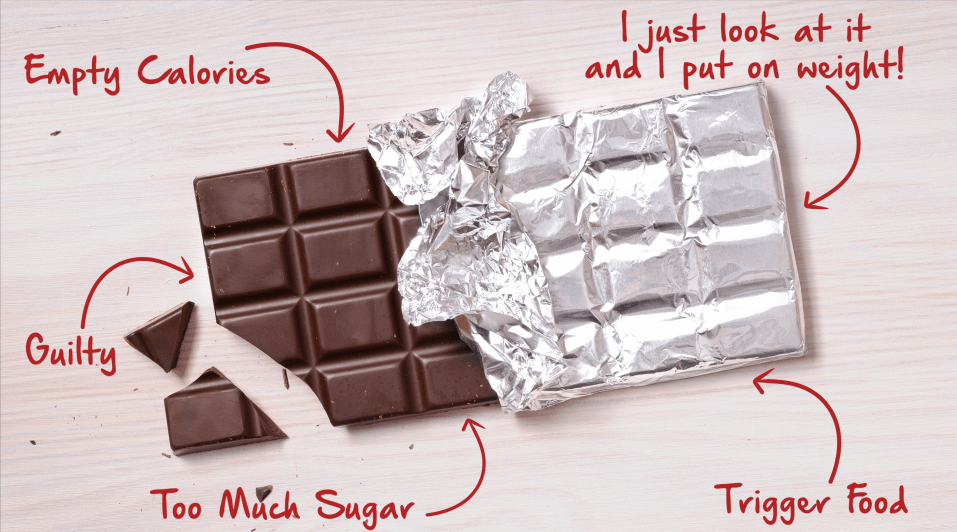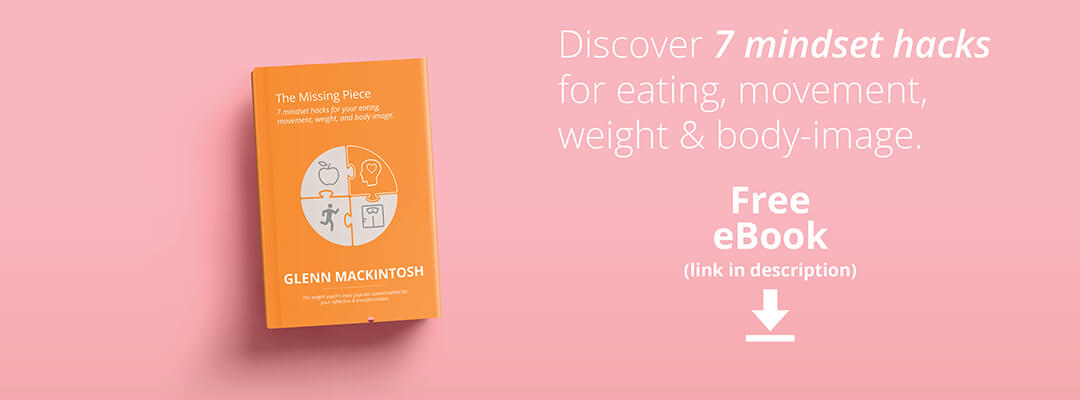
Overcoming fear of eating foods you feel are “bad”, “unhealthy” or “banned” can be tough. You may not even want to try, worrying you will feel guilty, binge on them, and of course, gain weight if you allow them in. But having rigid rules around foods leads to disordered eating habits that actually increase your risk of both unhealthy weight loss and unhealthy weight gain, not to mention having a massive cost to your state of mind and social life. Fortunately learning to any food in moderation and without guilt is possible! Here are Glenn’s 3 top strategies for how you can do it, and he even includes a mindful eating exercise you can try along with him 🙂
At 07:15 Glenn takes you through a mindful eating exercise for making friends with previously banned foods.
Watch Video
I created this video for people just like you.
If you found it valuable, please help me share it with them!
LINKS FROM VIDEO
FILEX: http://bit.ly/2J2k1AK
Vid on Forbidden Foods: http://bit.ly/2A6Hht4
Vid on Explaining Non-Dieting to Others: http://bit.ly/2Ei7WVl
Vid on Becoming an Intuitive Eater: http://bit.ly/2tLoBAK
SHOW NOTES
- Viewers’ questions about overcoming the fear of forbidden foods. [01:44]
- Why demonising foods is a problem. [02:30]
- The concept that food can be morally neutral. [03:33]
- On diet culture and moral judgements on food. [03:43]
- Getting over fear of eating ANY food. [05:10]
- Exposure therapy for food fears. [06:05]
- Activity: Mindful eating of a forbidden food. [07:02]
- Is having a positive relationship with all foods possible? Client story. [11:06]
- What if my mind goes into “party time” mode when I start allowing food? [12:59]
- Referral to previous TT about the 5 principles of becoming an intuitive eater. [13:28]
TRANSCRIPT
Hello, everyone. I’m Glenn Mackintosh, the Weight Psych. Today we’re going to show you how to overcome fear of eating bad foods.
Welcome to Thursday Therapy where I answer your questions on the psychology of eating, movement, weight and body image every couple of weeks. As always, we hope you’re doing well. As always, recently, we’re doing well. I guess the universe conspires in your favour when you really believe in what you’re doing and you love what you do.
I’ve been having people tell me to go to the FILEX Convention, which is Australia’s biggest fitness convention for years. This year, I thought I’m going to finally make it down there, and I’m looking it all up. I actually got offered to do not only one but two featured presentations. I’m really pumped to go down there and talk to Australia’s fitness professionals. I’m going to be talking about some of my favourite topics. One, how we get better outcomes in weight management; and two, how we apply non-dieting for a healthy relationship with food, which is actually the topic of today’s question.
Katie asks, “I spend weeks demonising food groups, evil carbs, then spend weeks recovering, then back afraid food, ashamed of myself, and the spiral goes on and on. My goal ultimately is a healthy relationship with food, and my biggest question is how to lose the fear. My eating issues started as a small girl, watching my anorexic mother restricting her food and unfortunately mine too, exercising excessively and purging. Every week was a new fad, and I was hungry all the time. I need to remember how to stop being afraid of food.”
This is an excellent question, Katie. As we talked about in the Thursday Therapy way back, a lot of bad things happen when you demonise food. You actually run the risk of both an unhealthy weight loss and an unhealthy weight gain, and you can develop disordered thinking and eating patterns that can lead to eating disorders like anorexia, bulimia, and binge eating disorder.
The good news is when you overcome this fear of eating certain foods, it’s a massive weight of your mind and so many good things happen. Not only do you lose the fear of eating the food, but you lose the guilt when you do eat the food, and your head is so much clearer and able to focus on more important things. This is exemplified by a recent client story who said, “I’m less hungry than before, but actually eating healthier and even less food, and I’m still looking forward to a weekend of socialising.” For the psychological and the social benefits alone, this will be absolutely transformational no matter what happens with your weight.
I want to introduce you to the concept that food can be morally neutral. What do I mean by this? Diet culture teaches us to place moral labels on food, and we see this with Katie. If we do a quick association, if I hold up this apple and ask, is this a good or a bad food? Pretty automatically because of what you’ve been taught, your brain probably says this is a good food. If I hold up these delicious chips and ask, is this a good or a bad food? Probably pretty instinctively, your brain will say this is a bad food. You might think it’s really yummy, but it might fall into that category of a bit of a guilty type pleasure.
The first thing in overcoming your fear of food is taking those evil judgments of it. If you eat an apple, you’re not helping an old lady cross the street. If you eat some chips, you’re not robbing a bank. As a psychologist, I think we probably judge ourselves and other people too much, but if you have to figure out some criteria with which to judge yourself, don’t choose what goes in your mouth. Maybe choose what goes out of your mouth or what you provide for the world or some other better criteria. I know my clients get this when they say something like, “Oh yeah, Glenn. It’s just food.” If you need help explaining this to other people, see our last Thursday Therapy where we talk about explaining non-dieting principles to those in your support network.
To get over your fear of eating any food, you’re going to have to eat it. Let’s be real. This is the hard part. You talk to anybody who works with people who have eating disorders or anyone who is experiencing an eating disorder themselves, and that will tell you that taking a food off the banned list and actually eating it comes with a lot of unpleasant feelings very often, more often than not. Even though there’s no real reason to feel guilty, those implicit associations and those judgements that you can’t quite get rid of overnight will probably make you feel guilty for eating the food. You might worry, especially if it’s your past experience that you can’t eat it in moderation, that you will just spiral out of control and, of course, you’re probably worried that you’re going to gain weight.
As with any fear, the key to overcoming it is to face it head on. Psychologists call this exposure therapy. You expose yourself to whatever is feared and then you learn through your own experience, it’s not comfortable doing it, but over time, you learn through experience that what you feared didn’t happen or if it did that you were totally okay. What I want you to do is be brave, have faith and face your fear of eating the food head on.
To successfully start eating foods that you’ve been a bit afraid of and then to be comfortable to keep eating them, you’re going to want to eat them in a way that you’re happy with. I want to show you some mindful eating skills that are really going to help. Anytime you have trouble incorporating a new food, I want you to come back to this video and do it with me.
Mindful eating starts with acknowledging the experience of eating. Anytime you’re eating, it’s like a little event. You probably know that mindful eating involves removing distractions, so it’s best done without the computer or the television. Some music is totally fine, and people are totally fine too. If you’re eating with people, it can be good to bring the attention to the food. I say to people, eat like a master chef judge and then you talk about the food and you bring the attention to it. I’m going to practise some mindful eating of some of these chips, which are probably a bit of a banned food for me, and I want you to get your food and we’ll go through the exercise together.
Part one, and this is the part that you might already know about, is about paying attention to the food with all of your senses. You can take your food and look at it. Often, it just goes hand to mouth without you even looking at what it looks like. I can see these little bubbles that I’ve never noticed before on these chips. You can smell it. This has a burnt kind of a smell. It’s quite nice. It smells like it’s been baked. When you taste it, really savour the taste, the texture and notice how it feels in your mouth and even the aftertaste.
For me, that was like a nice level of saltiness. I was expecting it to be really salty and it wasn’t, and a really good crunch as well. You want to pay attention with all of your senses. The idea is that you don’t eat foods like this for nutrition. You eat them for your mind, and you want to allow your mind the full experience so it feels as satisfied and is happy with the eating experience as possible.
The second part of mindfully eating foods that had previously been on the forbidden or the naughty list is learning to deal with the judgments that your mind will have about these foods. Remember, these are judgements that you’ve learned from diet culture, but because diet culture is so pervasive, you probably learned them pretty well. For now, you can’t ask yourself not to have these judgements. If I look at this chip, my mind says yum but it also says this is full of fat and says, Glenn, you’ve just had breakfast. You’re an idiot for eating this now. You might notice judgments about the food itself, judgments about what the food will do to your body or even judgments about yourself as you eat it.
What I want you to do is notice that those judgments are there. You can’t not have them, but I want you to think of them like a radio show that’s playing in the background and you just want to tune out of it as much as you can. Let it play and say whatever it says as you pay attention to the food that you’re eating. Let’s give it a go now. This is a skill like riding a bike or like sewing. It takes practise, and I think of it a bit like when you’re a kid, you’re taught to tap the top of your head and rub your tummy at the same time. You’re trying to focus on the pleasure of the food and just notice that those thoughts are thoughts and let them come and go at the same time. When you practise this for a while, over time, it’ll get a lot easier.
I want to share a little story with you about someone who has already overcome their fear of a lot of foods because this is a bit of work, and I just want you to know that the grass really is greener in the pasture where you can feel free to eat any foods that you want.
Kelly shares, “I never truly enjoyed food. Either I felt compelled to steer clear of my favourite foods, like potato chips and ice cream, or I ate them and felt guilty. I felt like I could never get enough, but it’s different for me now. As much as I love pizza, when my body has had enough, I just lose interest. I don’t have to fight my desire to eat because I just don’t want to eat anymore. Before, I didn’t know that I could trust myself. My fear was that if I let down my guard, I would eat out of control and just keep gaining weight, but that never happened. I don’t count my calories or limit fat. I don’t feel guilty when I eat, and everything is okay. I’m not scared of food anymore. My weight is stabilised, and it seems like my body is doing a pretty good job of taking care of me. More importantly, I can now say that I absolutely love food. I never knew chocolate was so amazing.”
If you can remove the labels from food and see it as just food, if you can overcome your fear of food by facing it head on, and if you can learn to eat it mindfully, you are well on your way to a positive relationship with food like Kelly. Now, don’t worry if your brain finally accepts that it is okay to eat these foods and it does go into party time mode. That’s not uncommon. Not everybody goes through that, but it’s not uncommon to have that for a week or two and it’s just part of the process. If that happens, don’t stress. It will die down.
Obviously, learning a positive relationship with food is an ongoing journey of discovery, so I’m going to provide a link to a previous Thursday Therapy where we actually talk about the five principles of becoming an intuitive eater, who is someone who has a great relationship with food and who eats well without trying.
I know I’m referring you to a lot of stuff, guys, but I really want to help you transform your relationship with food. I look back at all of the Thursday Therapies and I think, wow, there is so much information. It’s all related and it’s all free, so pardon the pun, sink your teeth right into it. Enjoy it. Good luck with practising changing your relationships with these particular foods. We’d love to hear your comments. If you liked this video, let us know, and of course if you haven’t already, subscribe for more videos and we’ll see you at the next Thursday Therapy.





